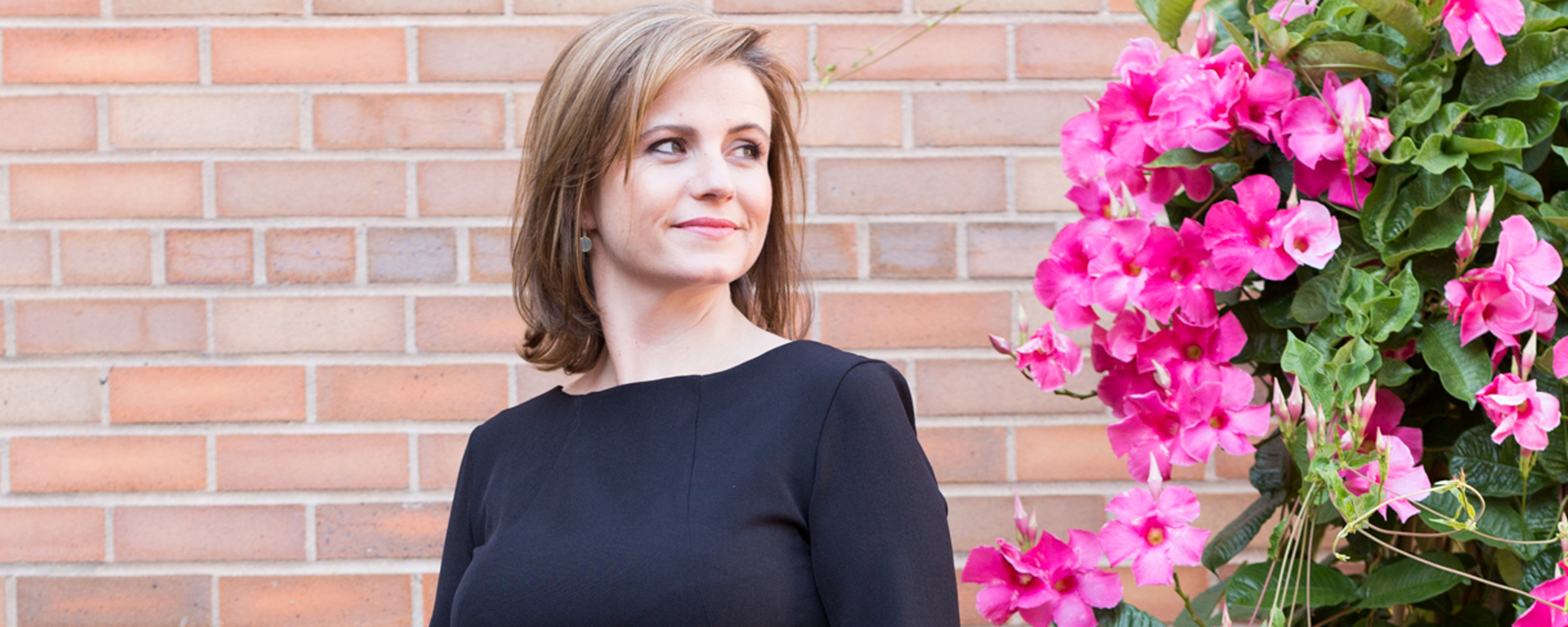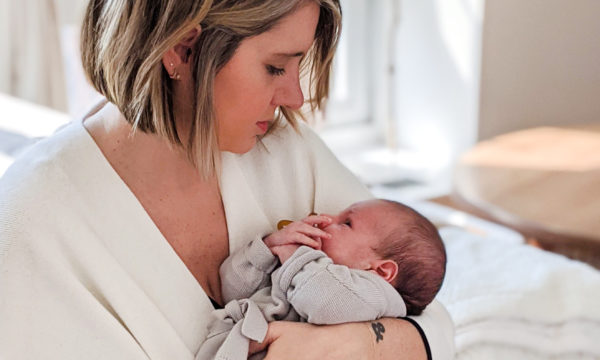Work/Life, Womansplained: weeSpring CEO Allyson Downey on Career and Motherhood
August 13, 2016 | Filed in: Woman of the Week
When Allyson Downey graduated from Columbia Business School in 2010, she landed a coveted job at a Wall Street investment firm. Then she got pregnant, and her doctor ordered her off her feet to avoid preterm labor. She wanted to work from home, but her company forced her to go on disability, essentially destroying her prospects for returning post-baby. She resigned at the end of her maternity leave. Today, she’s the CEO of a rapidly-growing startup called weeSpring (sort of like Yelp for kids’ products), a mother of two, and the author of Here’s the Plan: Your Practical, Tactical Guide to Advancing Your Career During Pregnancy and Parenthood, a new book aimed at helping women avoid the problems she faced on Wall Street. We spoke to her about the maternity leave trap, judge-y moms, and how to split up “thinking work” between parents.
To write your book, you interviewed dozens of women and sifted through endless amounts of data about moms in the workplace. What were you most surprised to learn?
I interviewed 75 women, and then I got more than 2,000 to respond to a survey that asked questions like, “How worried were you about telling your boss that you were pregnant?” Most responses ranged from “very worried” to “extremely worried.” And then I asked, “How did that conversation actually go?” Only 3% said that it went badly. It didn’t surprise me that women were worried about telling their bosses they were pregnant, but what did surprise me was that they weren’t worried about telling their colleagues. And your colleagues are the real risk because they’re likely to be shouldering your work while you’re gone. They’re the people who might undercut you, and be resentful that you’re away. They might be angling for your job, and they don’t have a sense of obligation, through HR or anti-discrimination policies or all those other so-called protections, to respect you. It’s important for women to think about how to talk to their colleagues about parental leave, too.
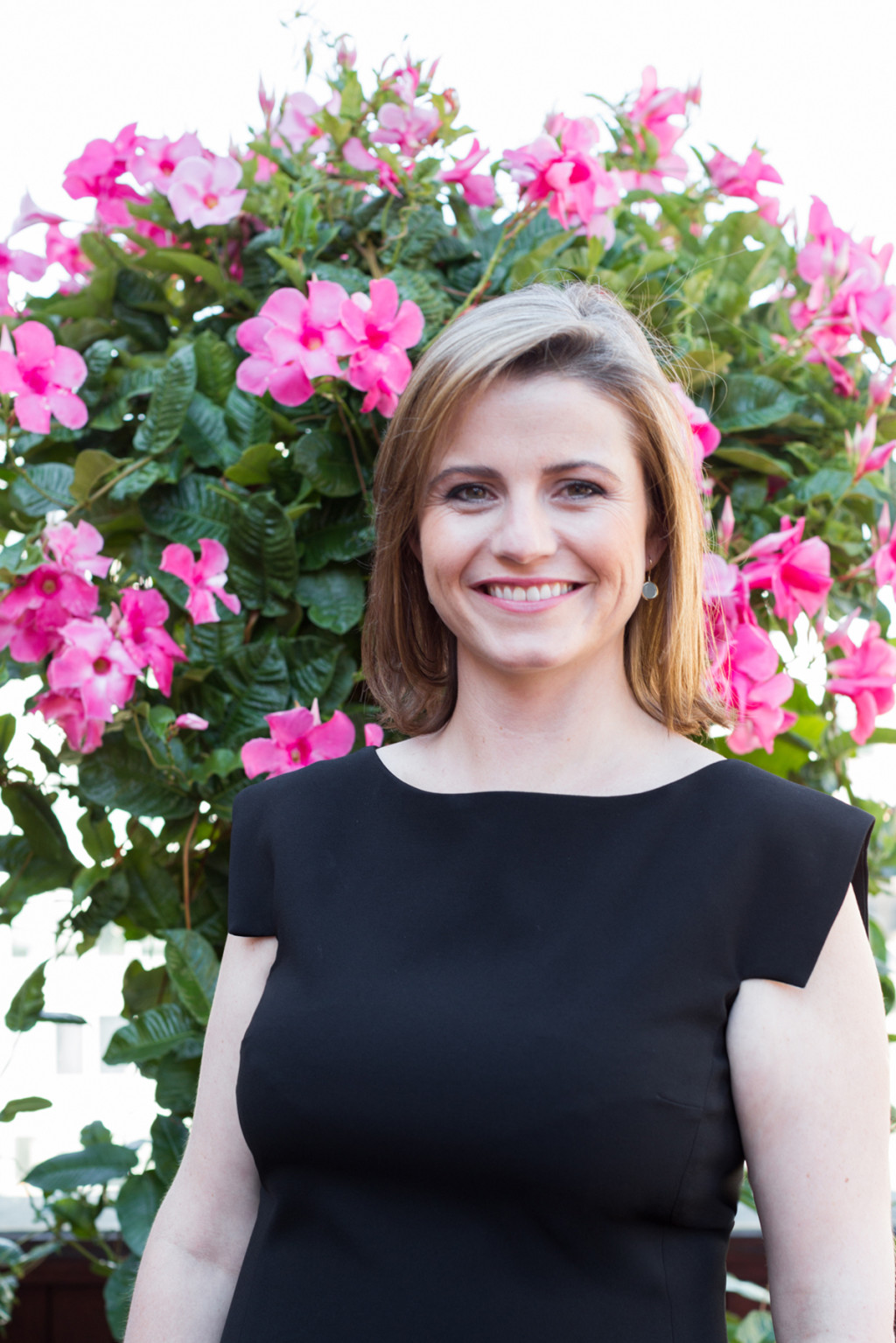
Allyson wears the Sarah 6.0 dress.
I was struck by your point that even if a woman doesn’t intend to have children in the near future or at all, she may still be treated as if she’s about to.
Yeah. A woman I know went to her boss a few years ago and said, “I have some bad news to share.” And her boss said, “You’re pregnant?” The actual news was that her husband had been transferred to Japan, so she was leaving her job to move with him—which was genuinely bad news for her boss and the company, as opposed to her being pregnant, which shouldn’t be bad news at all. The point is, it’s very much in people’s minds that female employees of a certain age are going to get pregnant. Even if you don’t intend to have children, people might assume that you will. There’s still a stigma of, “Oh, she’s a woman in her early thirties. The clock is ticking. Any day now, she’s going to take three months of leave. She won’t be as committed, or maybe she won’t come back.” Even women who are single get that. And it’s something we’re not going to fix until we have parental leave. Not just maternity leave, but paid parental leave. Because once men are seen taking an absence and leaving the office for three months, that’s what will finally give women a sense of equality, and help fix the pay gap and other problems that, until now, have been driven by motherhood.
You also make the very good point that maternity leave sets up an imbalance of parenting that continues long after the mom returns to work.
Going from being a couple to being a family is a groundswell change. But in the formation of that family, if one member is largely absent because he’s already back at work, then he’s going to get left out. Maybe dad’s around for one or two weeks, and then it’s just mom with the baby. Parenthood is like any new job—for the first two or three months you feel completely incompetent, and then you start to get your sea legs. But dad never gets to have that learning curve. So mom learns how to cut baby fingernails, and she gets really good at washing baby hair, and she knows the doctor well. And that becomes her expertise, and that never goes away. So even if she has a partner who wants to be egalitarian and supportive, he needs so much guidance from her that it’s simpler and easier to do it herself. The thinking work still falls on the woman.
What are some smaller-scale ways to get around that?
I think it’s important to separate responsibilities entirely rather than assigning or delegating tasks. In my family, I’m the chief procurement officer—I’m in charge of researching and buying all the things we need. My husband is in charge of every piece of mail that comes through the door of our house. I don’t think about it or worry about it, because it’s not on me. It’s his responsibility. It takes practice up front, but you need to divide that thinking work instead of just dividing the execution. Otherwise, even if your husband does all the cooking—which is wonderful—you still wind up doing all the thinking work for the week’s recipes and grocery shopping, and it’s just another thing you’re delegating.
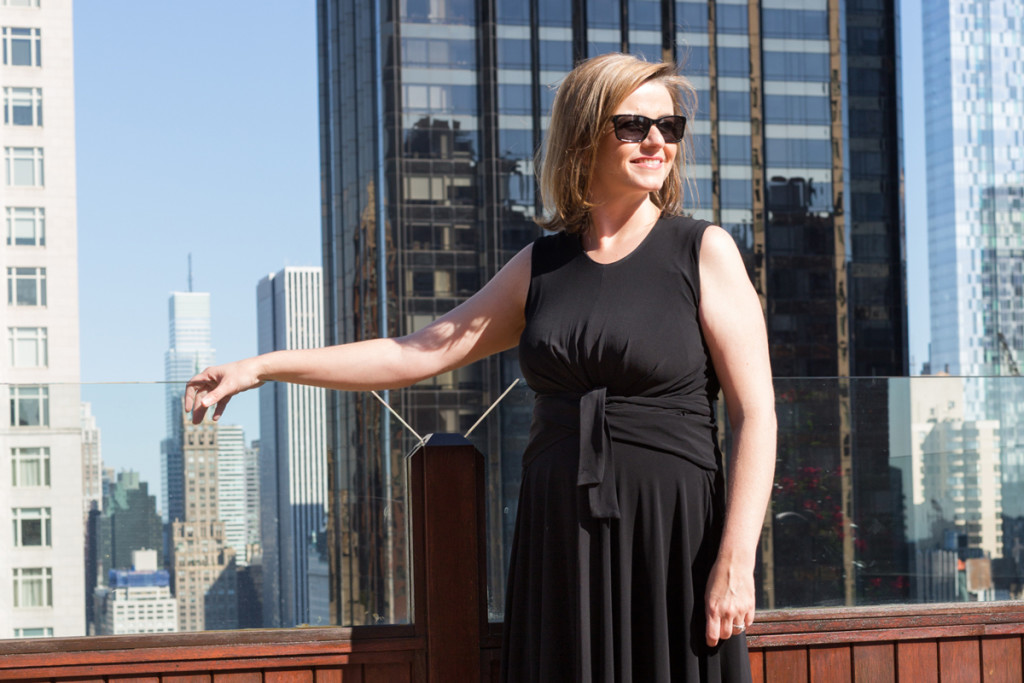
Allyson wears the Hannah 2.0 dress.
How else do you share responsibilities in your household?
If you’re a successful working woman and you earn a good salary, you should not feel guilty at all about hiring people to help make your life easier. You’re not neglecting your kids. You’re not shirking your wifely or womanly duties, or whatever you want to call them. Personally, our lives have been transformed now that our kids are in school, and we have an au pair who lives with us. Now I don’t have to be the one that says, “Please put your socks on!” Or, “Please finish eating your eggs!” Instead, I get to engage with my kids about nice stuff, like, “Tell me what you’re going to do today at school.”
Have you encountered judgment about taking a less hands-on approach?
Yeah. And I’ve had my own judge-y moments when I’ve thought, “What does that family need three nannies for?” But I bristle when I hear women say things like, “I didn’t have a baby so that someone else could raise it.” My personal standpoint is that having more people around my children who love them is a good thing. I’m a better person and a better mom when I feel fulfilled. I love my children, but I do not feel fulfilled after being only with them all day long. I know plenty of people who are, and that’s wonderful, and I applaud them—but I get bored. I need diversity in my days where I’m able to do different things that are challenging and interesting. When I do, by the time I’m sitting on the floor with my kids, I’m really able to focus on them, instead of being like, “Oh my god, another hour building Lego towers.”
You recently moved from New York to Boulder, CO. How come?
Part of it was that I wanted a more manageable life. I hate the term “work/life balance,” because it conjures this idea that you’re walking on a tightrope. But in New York, we were never going to have the life that we wanted. My son was going to preschool on the Upper East Side, where all the other parents were hedge fund masters of the universe. Looking at them, I was like, “When are we going to get NetJets?” Which is not even something that I want, but when you’re exposed to that, you think that something’s missing from your own life. There are all those fascinating studies about how people’s happiness level is relative to what people around them have. Like, if you’re making $50,000 a year and all the people around you are making $40,000, then you’re still much happier than if you’re making $200,000 a year and everyone around you is making $250,000. Life in New York felt hard and harried, like I was in this never-ending rat race. We moved to Boulder to make that easier.
What’s your average workday like now?
I’ve been making a lot of sales calls for weeSpring lately, and I’m working with a friend of mine who’s a sales coach. He listens in on my calls and sends me Gchats about what I should say. It’s so great—it’s like having a personal trainer for calls. His big mantra is, “Don’t sell, storytell.” Because I’ll start to sell, and say, “This is how awesome we are at this thing.” And he’ll say, “Let them connect the dots. Tell them a story about something you’ve done, and they’ll realize how valuable you could be to them.”
Any other positive work habits that you recommend?
On Friday afternoons, I take 10 or 15 minutes to write down everything I’ve accomplished that week. Women spend so much time worrying about what we haven’t done that we rarely celebrate what we have done. I like having a tangible written record of everything I’ve done. For women in corporate jobs, it’s powerful to have for your performance review; for me, it’s a great tool to use with investors, and to chart the points of progress we’ve made.
How did you manage to run your company while you were writing your book?
When I was writing, I’d work a full day on weeSpring, and then stay at my office and eat something and write the book from about 6:30-11:00pm. And that sucked, but I was really only working like that for a month. You can’t live your life like that, but you can do a sprint for a short period of time.
How do you keep yourself from getting fried?
Calls can be particularly draining, so I do things that are restorative. Right now, I’m taking pottery classes—wheel-throwing can be really meditative. And this might sound weird, but I get so much peace of mind from our Roomba. It gives me great satisfaction to see that little thing going around and cleaning the house.
Is there anything you’ve decided not to spend time on?
I don’t exercise. I wish I did, but I haven’t found that thing that I like. I’ve also accepted that I’m not the parent who’s going to be super involved with her kids’ school and social lives. With great respect and admiration and gratitude, I leave that stuff to other parents. My prior type-A self would have tried to be the room parent and bake sale organizer, but I’m not that person anymore, and that’s okay.

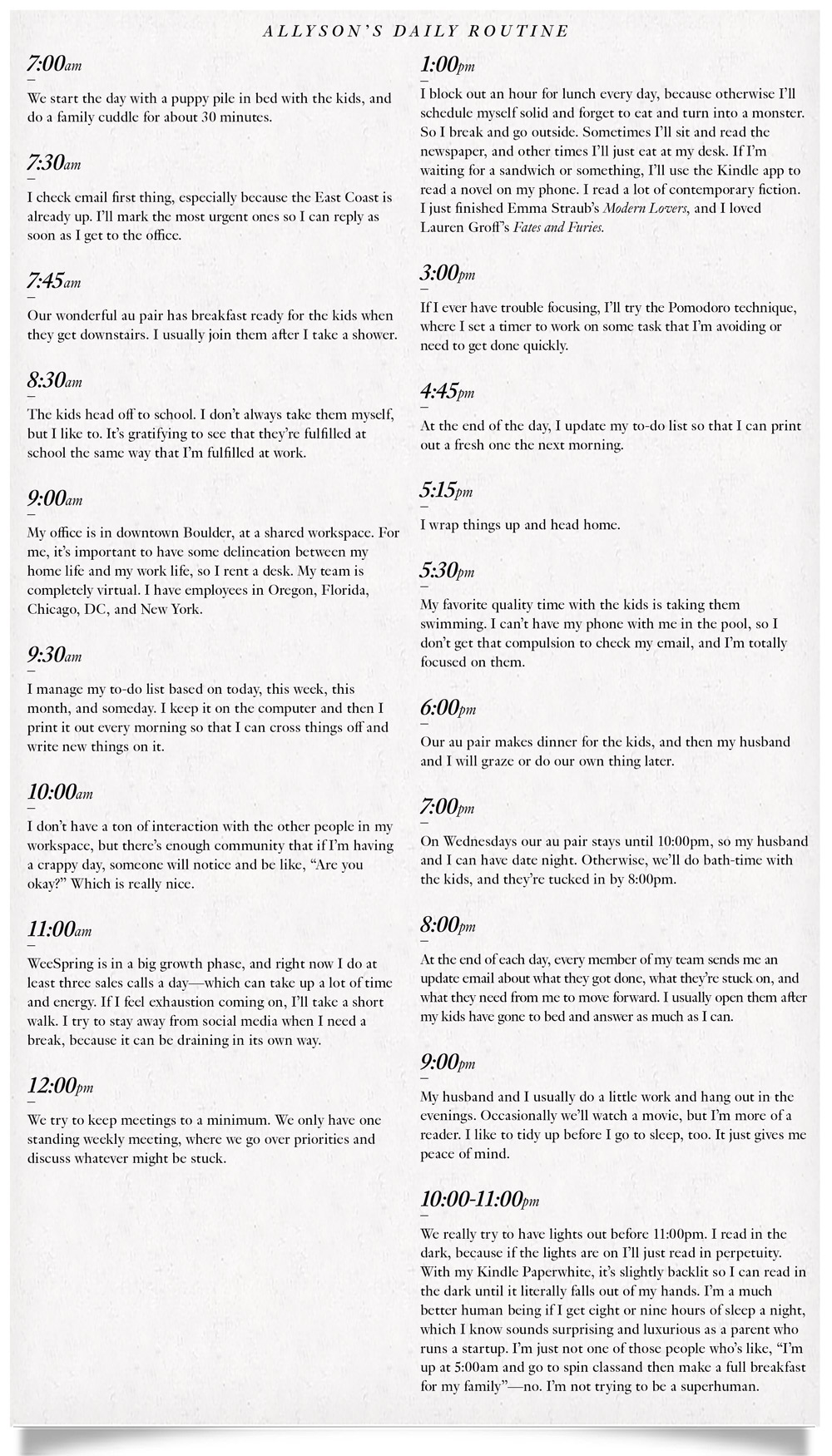
Photographs by Frances F. Denny.





